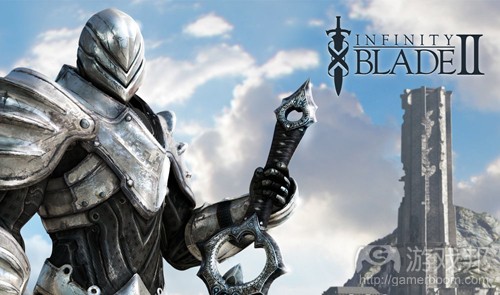Donald Mustard谈《无尽之剑 II》的社交体验
作者:Christian Nutt
《无尽之剑》开发商Chair Entertainment创始人Donald Mustard认为,“游戏设计师是时候开始寻找新途径,新类型以及新方法以更好地利用我们随身携带的这些强大的移动设备。”
上周,该公司通过引入社交功能Clashmobs(游戏邦注:让世界各地的玩家拥有集体目标,如共同需要对付的boss)而更新了《无尽之剑II》。每个玩家虽然只能对boss造成一小部分伤害,但是他们却能够共同完成任务并获得奖励。
Chair的社交游戏理念
推出这一功能起因很明显。Mustard表示,只要30秒的时间,“我便能够打开Clashmob,加入汇聚了世界各地上百万人的社区,快速感受到一种有意义且不断发展的游戏体验。”
“你会发现不管是Ville类还是With Friends类的社交游戏都取得了巨大的成功,它们深入挖掘了独特的社交意识,甚至超越了游戏本身。”
而这些游戏与《无尽之剑II》Clashmob功能最大的差别就在于:“我们总是在想办法在游戏中添加更多社交元素而不是将其作为一种单纯的社交系统。”这位开发者的这番言论并不令人意外(他曾受《银河战士》影响而制作了Xbox Live Arcade游戏《Shadow Complex》,现在转向了iOS平台),但这个过程将充满挑战。
他是否会创造出像单人游戏那样丰富并且颇具体验性的社交游戏玩法?Mustard说道:“对于我来说,这是一种大胆的尝试。”他同时也表示,Clashmob只是他们计划中的“冰山一角”。
将这个新内容添加到《无尽之剑II》中有一个优点,Mustard说道:通过将游戏套在“一个已经取得巨大成功的框架中,我们能够借由游戏更新而尝试一些更具有风险的挑战。”
游戏设计师的职责
Mustard表示:“我们所坚持的原则是努力创造出更加优秀的游戏,而如果我们希望取得领先地位,就需要放宽视线并尝试一些不同的新理念。”
“所有游戏设计师的职责便是努力创造出更具有创新性且有趣的游戏体验。”
但是这并不意味着设计师需要白费力气做些重复的工作,而是“我们需要始终观察着局势的发展,并自问自己它们是否朝着正确的方向前进。”
所以他便为自己设定了《无尽之剑II》这个复杂的任务。他说道:“对我来说最优秀的游戏是那些能够凭借有趣的玩法吸引玩家的游戏。我们一直在努力创造一些真正吸引人的游戏内容,即存在一种基于技能的机制而不只是单纯地掷骰子或单击按钮。这是关于让玩家能够变得越来越厉害的机制。”
让玩家变得越来越厉害是《无尽之剑》系列能够吸引玩家的核心元素。在一款游戏中,玩家可能会在遭遇God King时便死亡,但是他们却不会意识到自己在后来打败God King更多是因为技能的提高,而不是角色属性的发展。
Mustard说道:“我们并没有耍任何手段。我们并没有强迫God King去杀死你的角色。”
“技能也许不是你打败God King的关键,但是它却是一种可能因素。当我完成《无尽之剑》并在第一次尝试游戏时我便能够打败God King了,因为我拥有这种技能。”
Mustard表示:“我们所允许玩家提高的技能指标远远小于他们真正能够做到的,也就是实际上玩家的技能是成倍地增长。这就是为何当玩家在《无尽之剑》的最后刺穿God King胸膛时能够感到自己非常伟大。”
社交与发展的组合
但是对于Mustard来说,基于技能的游戏玩法并非取得成功的唯一要素,不过他认为我们有必要在此回归本质去思考这一问题。也就是游戏真正应该做些什么。
Mustard说道:“人类具有两大天性:我们天生就具有社交性,另外我们生来就追求发展。”
“如果你拥有一个强大的核心机制,然后你开始在这一机制上添加其它我们所提到的内容,包括社交功能,以及玩家可以随着时间的发展而不断壮大的RPG机制,那么你便能够创造出一款优秀的游戏。”
“最优秀的游戏能让玩家获得真正意义上的发展。对我来说,在社交中获得发展是我们人类的重要追求。”
(本文为游戏邦/gamerboom.com编译,拒绝任何不保留版权的转载,如需转载请联系:游戏邦)
The social destiny of Infinity Blade II
by Christian Nutt
“It’s time for us as game designers to find new ways, new genres, new methodologies, and this is an attempt at looking at the way we interact with these powerful devices that we’re carrying around in our pockets,” says Donald Mustard, co-founder of Infinity Blade creators Chair Entertainment.
Last week, the developer updated Infinity Blade II with Clashmobs — social small-bite challenges which give players around the world collective goals, such as bosses to defeat. Each player may only be able to deal a fraction of the damage that the boss can take — but each player can contribute to the overall success of the mission and reap the reward.
Social Gaming Comes to Chair
The inspiration for this feature is clear. In 30 seconds, says Mustard, “I could open up a Clashmob, participate with millions of other people around the world, and actually get a meaningful, progressive experience that quickly.”
“You look at the success of a lot of the more social games, your Villes and your With Friends… They are tapping into some really unique social consciousness, even beyond the game itself,” he says.
The difference between those games and Infinity Blade II’s Clashmobs is that “we’re trying to look at a way to say how can we wrap more of a game around that, as opposed to it just being a social system.” This is not a surprising statement from the man who made his name with the Metroid-influenced Shadow Complex for Xbox Live Arcade before turning his hand to iOS, but it will be a challenge.
Can he really make social gameplay as rich and rewarding to players as traditional single play? “To me, that’s why this is a big experiment. We’ll see,” says Mustard. Still, he says, Clashmob is “really just the tip of the iceberg.”
There is an advantage of launching this new content into Infinity Blade II, he says. “Updating the game allows us to experiment with a lot of that stuff that’s a little more risky,” by overlaying it on “a framework that we know is successful.”
The Responsibility of a Game Designer
“Our philosophy is that we need to create great games, and if we’re going to be on the bleeding edge a little bit, it’s our responsibility to look forward and come up with new stuff,” says Mustard.
“For all game designers, our responsibility is to make new, interesting experiences.”
While he doesn’t think this means designers need to continually reinvent the wheel, he says that “we need to be constantly looking at the wheel and saying, ‘Is it a wheel yet?’”
He’s set himself a complex task with Infinity Blade II. “I want you to feel like you’re playing a game with a million people, but at the same time are still really connected to your friends, and at the same time are intrinsically rewarded for what you bring to the table,” he says.
The Drive to Progress
Typical social game nudges won’t do that. Neither will games that players inevitably progress in. “To me, the best kinds of games are games that you are drawn to because the gameplay is truly fun,” says Mustard. “We’re trying to make things that are actually engaging, where there’s a mechanic that is skill-based, beyond just a dice roll or a button click. It’s something that you can become better at.”
This concept — of the player getting better — is core to the appeal of the Infinity Blade series, he argues. In the first game, players would die in their early encounter with the God King — but what they may not have realized is that when they beat him later, it was more about their own skill increasing, and less about stat boosts.
“We didn’t pull any tricks,” says Mustard. “It wasn’t that we forced him to kill you.”
“Your skill wasn’t to the point you can beat him. But it was possible. By the time I was done making Infinity Blade, I could beat the God King on my first try, because I had the skill to do it.”
“The numbers that we actually allowed you to increase were much smaller than what was actually happening, which is that your skill was exponentially increasing,” says Mustard. “That’s why when people finally stab the Infinity Blade through the God King’s chest, it felt so empowering.”
“They actually did it.”
The Right Mixture
But to him, it’s not just that skill-based gameplay that is a recipe for success, though he believes it’s now coming back into its own again. It’s the total blend of what games can do.
“Inherently, as human beings, we are two things: we are inherently social, and we inherently want to progress,” says Mustard.
“If you have an engaging core mechanic and you start to layer on top of it these other things we’re talking about, like these social features, and these RPG mechanics where your player can grow over time, then you start to get it.”
“The best games allow you to achieve true progression,” says Mustard. “Social with progression starts, to me, to be what we want to achieve as human beings.” (source:GAMASUTRA)
上一篇:列举游戏设计师应该掌握的重要技能








































 闽公网安备35020302001549号
闽公网安备35020302001549号